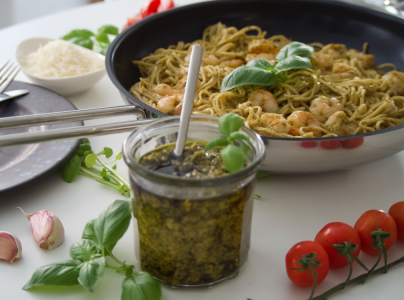Popular condiment leaves shopper on the brink of death
Behind every great meal is a set of great ingredients.
Now, while we generally associate condiments with enhancing our meal's flavour, none of us would expect such harmless kitchen staples to cause a life-threatening condition.
That's exactly what happened to one lady who ended up fighting for her life after consuming a popular blend of herbs usually mixed with pasta or bread: pesto.
On December 31, 2021, Doralice Goes purchased a jar of homemade pesto from a market she frequented, stashed it in her pantry, only to use it a few weeks later for a meal.
Ms Goes mentioned that the condiment didn’t have an expiration date, but she was given instructions on how to store the bottle.
‘The pesto remained with unchanged appearance, colour, aroma, and flavour. When I decided to finally have some, it was delicious,’ she said. The pesto was consumed on January 23, 2022.
Unfortunately, the enjoyment was short-lived. The very next day, Ms Goes already knew something was wrong.
‘My body didn't feel right, my breathing had gotten worse, and my tongue felt like it was tingling,’ she shared.
Despite her worsening symptoms, she still managed to drive 20 kilometres away to a hospital.
Upon arrival, she recounted her ordeal, 'I couldn't move my body, so I threw myself out the car.'
A hospital employee with a wheelchair saw her in the car park, and she was immediately rushed in for a Computed Tomography (CT) Scan.
Toxins, doctors discovered, had seeped into Ms Goes' nervous system. She was only able to move two toes in a neurological examination.
She was eventually diagnosed with botulism—a rare illness that attacks nerves, causing muscle paralysis and breathing difficulty, and is potentially lethal.
An anti-botulinum drug was administered to Ms Goes, and to her relief, she started feeling minor improvements. Physical therapy soon became part of her daily routine to strengthen her bodily muscles.
‘I soon was able to move my fingers and speak small sentences again. I was also given physiotherapy to strengthen the muscles in my body,’ Ms Goes shared.
Doctors tried to find the source of the toxin and asked Ms Goes what food she had consumed before she felt sick. She immediately thought of the bottle of pesto.
‘It was one of the only things I had recently eaten, plus, it was homemade. It seemed that a bacteria had formed in the pesto, which contained a toxin,’ she admitted.
Ms. Goes' life completely changed since her fateful meal. She had to remain for an entire year in the hospital for her rehabilitation and recovery.
'I had treatments every day of the week. From myofascial release to analgesia, laser, suction cup, pilates to recover muscular tone, strengthening and pulmonary physiotherapy,' she shared.
She added: ‘I was also given dry compressions and electroshocks to relieve chronic pain. When I got more strength in my upper body, I also adapted to playing table tennis.’
‘I have been breathing without help for nine months, which is a good sign. I can now urinate by myself and feed myself. I have the help of a walker to help me get around, but it is still hard,’ Ms Goes said.
She stated that the ordeal she endured taught her to be extra cautious about where she purchases her food.
‘I'm careful when buying from restaurants, shops, fairs. I now only like to buy food from manufacturers to avoid any more accidents,’ she explained.
As for the homemade pesto she bought from the store, Ms Goes—a native of Brazil—revealed that their State Health Surveillance Department paid the store a visit to inspect the conditions under which the pesto was made.
The store owner apologised for the incident, but no further action has reportedly been taken.
What exactly is botulism?
Botulism is caused by a toxin produced by Clostridium botulinum bacteria, which can be found in soil, dust, and food not prepared or stored safely.
According to Health Direct, food can be contaminated if it is not heated enough to destroy the toxin produced by the bacteria.
Some foods, like fermented, salted or smoked fish and meat, home-preserved produce or meat, and canned goods, have a high risk of contamination.
Don’t worry, members, Health Direct has given food and hygiene rules to prevent consumers from contracting this rare disease.


Stories like this are a cautionary tale about the importance of food safety, particularly when purchasing ready-to-use or homemade food items.
It's a tough reminder of how even the most ordinary food items can have extraordinary consequences if we don't take the necessary care and gather as much information about the product as possible.
What do you think of this story, members? Share your thoughts in the comments below!
Now, while we generally associate condiments with enhancing our meal's flavour, none of us would expect such harmless kitchen staples to cause a life-threatening condition.
That's exactly what happened to one lady who ended up fighting for her life after consuming a popular blend of herbs usually mixed with pasta or bread: pesto.
On December 31, 2021, Doralice Goes purchased a jar of homemade pesto from a market she frequented, stashed it in her pantry, only to use it a few weeks later for a meal.
Ms Goes mentioned that the condiment didn’t have an expiration date, but she was given instructions on how to store the bottle.
‘The pesto remained with unchanged appearance, colour, aroma, and flavour. When I decided to finally have some, it was delicious,’ she said. The pesto was consumed on January 23, 2022.
Unfortunately, the enjoyment was short-lived. The very next day, Ms Goes already knew something was wrong.
‘My body didn't feel right, my breathing had gotten worse, and my tongue felt like it was tingling,’ she shared.
Despite her worsening symptoms, she still managed to drive 20 kilometres away to a hospital.
Upon arrival, she recounted her ordeal, 'I couldn't move my body, so I threw myself out the car.'
A hospital employee with a wheelchair saw her in the car park, and she was immediately rushed in for a Computed Tomography (CT) Scan.
Toxins, doctors discovered, had seeped into Ms Goes' nervous system. She was only able to move two toes in a neurological examination.
She was eventually diagnosed with botulism—a rare illness that attacks nerves, causing muscle paralysis and breathing difficulty, and is potentially lethal.
An anti-botulinum drug was administered to Ms Goes, and to her relief, she started feeling minor improvements. Physical therapy soon became part of her daily routine to strengthen her bodily muscles.
‘I soon was able to move my fingers and speak small sentences again. I was also given physiotherapy to strengthen the muscles in my body,’ Ms Goes shared.
Doctors tried to find the source of the toxin and asked Ms Goes what food she had consumed before she felt sick. She immediately thought of the bottle of pesto.
‘It was one of the only things I had recently eaten, plus, it was homemade. It seemed that a bacteria had formed in the pesto, which contained a toxin,’ she admitted.
Ms. Goes' life completely changed since her fateful meal. She had to remain for an entire year in the hospital for her rehabilitation and recovery.
'I had treatments every day of the week. From myofascial release to analgesia, laser, suction cup, pilates to recover muscular tone, strengthening and pulmonary physiotherapy,' she shared.
She added: ‘I was also given dry compressions and electroshocks to relieve chronic pain. When I got more strength in my upper body, I also adapted to playing table tennis.’
‘I have been breathing without help for nine months, which is a good sign. I can now urinate by myself and feed myself. I have the help of a walker to help me get around, but it is still hard,’ Ms Goes said.
She stated that the ordeal she endured taught her to be extra cautious about where she purchases her food.
‘I'm careful when buying from restaurants, shops, fairs. I now only like to buy food from manufacturers to avoid any more accidents,’ she explained.
As for the homemade pesto she bought from the store, Ms Goes—a native of Brazil—revealed that their State Health Surveillance Department paid the store a visit to inspect the conditions under which the pesto was made.
The store owner apologised for the incident, but no further action has reportedly been taken.
What exactly is botulism?
Botulism is caused by a toxin produced by Clostridium botulinum bacteria, which can be found in soil, dust, and food not prepared or stored safely.
According to Health Direct, food can be contaminated if it is not heated enough to destroy the toxin produced by the bacteria.
Some foods, like fermented, salted or smoked fish and meat, home-preserved produce or meat, and canned goods, have a high risk of contamination.
Don’t worry, members, Health Direct has given food and hygiene rules to prevent consumers from contracting this rare disease.
Key Takeaways
- A woman from Brazil named Doralice Goes was left paralysed after consuming pesto allegedly contaminated with toxins that cause botulism.
- Botulism is a rare illness induced by a toxin that attacks the body's nerves and can cause difficulty breathing, muscle paralysis and death.
- Doralice was hospitalised in January 2022 after falling ill from the pesto, which she had bought from a local market but had no expiry date.
- Despite surviving the ordeal, Ms Goes had to remain in hospital for a year for recovery and rehabilitation.
Stories like this are a cautionary tale about the importance of food safety, particularly when purchasing ready-to-use or homemade food items.
It's a tough reminder of how even the most ordinary food items can have extraordinary consequences if we don't take the necessary care and gather as much information about the product as possible.
What do you think of this story, members? Share your thoughts in the comments below!









